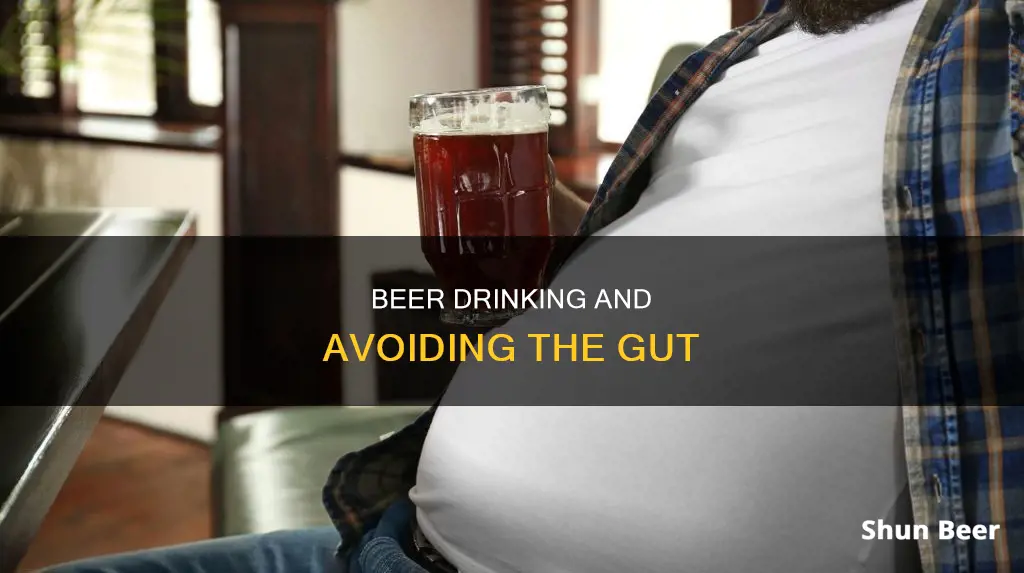
Drinking beer is often associated with having a beer belly, but is it really the cause? Beer drinkers around the world tend to grow bellies, especially as they get older, and especially if they are men. However, not all beer drinkers have a beer belly, and some teetotalers sport large ones. So, what causes this phenomenon?
| Characteristics | Values |
|---|---|
| Alcohol's role in weight gain | Alcohol plays a role in weight gain in general. |
| Beer's role in weight gain | Beer can add to abdominal obesity by contributing calories. |
| Calories in beer | A standard 12-ounce beer contains about 150 calories; a light beer, about 110 calories. |
| Alcohol's impact on appetite | Alcohol stimulates your appetite, which can lead to eating more. |
| Alcohol's interference with fat-burning | Alcohol gets in the way of your body's ability to burn fat as the liver burns alcohol instead of fat. |
| Genetics and fat storage | Sex assigned at birth may be the biggest genetic factor in where the body stores fat. Women tend to store fat in their arms, thighs, and buttocks, as well as their bellies, while men tend to store more fat in their bellies alone. |
| Health risks of excess abdominal fat | Linked to an increased risk for health problems, including erectile dysfunction, fatty liver disease, high blood pressure, and polycystic ovary syndrome. |
| Strategies to reduce abdominal fat | Lower-calorie beer, combining strength and cardio fitness programs, and scaling back on alcohol consumption. |
What You'll Learn
- Beer doesn't cause a beer belly, but it can contribute to it
- Alcohol stimulates your appetite and impairs your judgment, leading to unhealthy food choices
- Alcohol gets in the way of your body's ability to burn fat
- Genetics and hormones play a role in where your body stores fat
- Beer lovers can opt for light beers or limit their consumption to weekends

Beer doesn't cause a beer belly, but it can contribute to it
It's a common misconception that beer is the main culprit behind the infamous "beer belly". While it's true that alcohol consumption can lead to weight gain, the idea that beer specifically targets the abdomen is a myth. So, while beer doesn't directly cause a beer belly, it can certainly contribute to it.
The real culprit behind the beer belly is excess calorie intake, which can come from various sources, including alcohol, sugary drinks, oversized portions, and high-calorie bar snacks like pizza and wings. Beer, with its high calorie content, can easily tip the balance between calorie intake and calorie burn, leading to weight gain.
On average, a standard 12-ounce beer contains about 150 calories, and these calories can quickly add up if you're downing several in one sitting. Moreover, alcohol interferes with your body's ability to burn fat. When you consume alcohol, your liver prioritises burning off the alcohol instead of breaking down fat for energy. This interference with fat metabolism can further contribute to weight gain.
Another way beer contributes to the beer belly is by stimulating your appetite. Alcohol can make you eat more than you usually would and impair your judgment, leading to less healthy food choices. The combination of high-calorie drinks and fatty foods can significantly increase your calorie intake.
In addition to contributing to weight gain, beer and alcohol consumption are linked to various health risks. Excess weight around the midsection is associated with an increased risk of health problems such as type 2 diabetes, high blood pressure, cardiovascular disease, erectile dysfunction, and fatty liver disease.
So, while beer alone may not be the sole cause of a beer belly, reducing beer consumption and making healthier choices can be an important part of a weight management strategy. This may include opting for lower-calorie beers, drinking in moderation, or combining strength and cardio fitness programs with a balanced diet and appropriate portions.
Pumping and Drinking: Is It Safe to Mix?
You may want to see also

Alcohol stimulates your appetite and impairs your judgment, leading to unhealthy food choices
Alcohol can stimulate your appetite and impair your judgment, leading to unhealthy food choices. Alcohol is a potent appetite stimulant, and it interferes with the body's hunger hormones, ghrelin and leptin, which regulate appetite. Ghrelin is the "hunger hormone," signalling hunger to the brain, and leptin signals fullness. When these signals are disrupted, you may feel hungry even after a few drinks, even if you are actually full. This can lead to increased food consumption and poor food choices, such as opting for high-calorie, unhealthy snacks and meals.
Additionally, alcohol increases thermogenesis, or calorie utilisation causing heat production, which means you may feel hungry again faster than usual. It also affects neurochemical systems that play a role in appetite regulation, including the hormones Leptin and GLP-1, which suppress appetite. When alcohol enters the body, it inhibits these hormones, leading to increased hunger.
Furthermore, alcohol stimulates the same neurons in the brain that are triggered when the body goes into starvation mode, which can result in ethanol-induced overeating. Alcohol also reduces self-control, making it more likely that individuals will give in to food cravings and make unhealthy food choices.
The combination of increased appetite, impaired judgment, and reduced self-control can lead to unhealthy food choices and overeating, contributing to weight gain and other negative health consequences.
Beer Sales Strategies During Doubleheaders
You may want to see also

Alcohol gets in the way of your body's ability to burn fat
Alcohol can indeed get in the way of your body's ability to burn fat. This is because your liver, which plays a crucial role in metabolising proteins, carbohydrates, and fats, prefers to break down alcohol instead of fat. In other words, when alcohol is present, your liver will prioritise burning it off before turning to fat. This interference with fat burning can contribute to weight gain, especially around the abdomen, commonly known as a "beer belly".
The impact of alcohol on fat burning is not just a theory, it has been observed in studies. Research has shown that alcohol activates cells in the brain associated with starvation, causing increased hunger and overeating. This effect, combined with alcohol's ability to impair judgement and lower inhibitions, often leads to poor food choices and increased calorie consumption.
Furthermore, alcohol is high in empty calories, providing 7 calories per gram compared to 4 calories per gram for carbohydrates and protein. These empty calories offer no nutritional value and can easily contribute to weight gain, especially when combined with the reduced fat-burning capacity of the body.
The good news is that light-to-moderate alcohol consumption does not necessarily cause weight gain. It is the regular heavy drinking that leads to weight gain over time. The National Institute on Alcohol Abuse and Alcoholism (NIAAA) defines heavy drinking as more than three drinks per day or seven drinks per week for women, and more than four drinks per day or 14 drinks per week for men.
If you are concerned about the impact of alcohol on your weight, there are some strategies you can employ. Firstly, choosing lower-calorie alcoholic beverages and drinking in moderation can help. Additionally, drinking with food can help you make better food choices and avoid junk food. Staying hydrated by drinking a glass of water for every alcoholic drink can also help slow down your consumption.
Morning Beer: Should You Drink Before Work?
You may want to see also

Genetics and hormones play a role in where your body stores fat
The sex assigned at birth is the biggest genetic factor in where the body stores fat. Women tend to store fat in their arms, thighs, buttocks, and bellies, while men tend to store more fat in their bellies alone. However, this is not true for everyone. As people age and their hormone levels decrease, they become more likely to store fat in their midsections.
Hormones also play a role in where the body stores fat. Oestrogens and androgens help decide body fat distribution. Oestrogens are sex hormones made by the ovaries in pre-menopausal women. They are responsible for prompting ovulation every menstrual cycle. Men and postmenopausal women do not produce much oestrogen in their testes or ovaries. Instead, most of their oestrogen is produced in their body fat, although at much lower amounts than what is produced in pre-menopausal ovaries. In younger men, androgens are produced at high levels in the testes. As a man gets older, these levels gradually decrease. The changes with age in the sex hormone levels of both men and women are associated with changes in body fat distribution. While women of childbearing age tend to store fat in their lower body, older men and postmenopausal women tend to increase storage of fat around their abdomen. Postmenopausal women who are taking oestrogen supplements don’t accumulate fat around their abdomen. Animal studies have also shown that a lack of oestrogen leads to excessive weight gain.
Antibiotics and Beer: A Safe Mix?
You may want to see also

Beer lovers can opt for light beers or limit their consumption to weekends
Beer lovers, rejoice! You don't have to give up your favourite beverage completely to avoid a beer belly. Here are some tips to enjoy your beer and maintain a healthy weight:
Opt for Light Beers: Choose light beers with lower calorie content. A typical beer has around 150 calories, while a light beer contains about 110 calories. By making this small change, you can significantly reduce your calorie intake without sacrificing your enjoyment.
Limit Consumption to Weekends: Instead of drinking beer every day, make it a weekend treat. This way, you'll still get to savour your favourite brew, but with reduced frequency. It's all about moderation!
Watch Your Portion Size: Beer calories can add up quickly, especially if you're drinking several in one sitting. Be mindful of how much you're consuming, and try to stick to a reasonable number. Remember, drinking in moderation is key.
Pair with Healthy Meals: Alcohol can increase your appetite, leading to unhealthy food choices. Combat this by pairing your beer with a healthy meal. Enjoy your drink with a nutritious dinner or some tasty, low-calorie snacks.
Be Mindful of Calories in Food: Beer often goes hand-in-hand with calorie-dense foods like pizza, wings, and fried fare. Be conscious of these additional calories and opt for healthier alternatives. Choose grilled options, salads, or veggies and hummus instead.
Exercise Regularly: Combining exercise with a balanced diet is crucial. Aim for aerobic exercises like running, swimming, cycling, or tennis, which are great for reducing body fat. Strength training and cardio workouts can also help you stay fit and healthy.
Remember, it's not just about the beer itself but also your overall calorie intake and lifestyle choices. By making mindful decisions and incorporating healthy habits, you can enjoy your beer without worrying about the dreaded beer gut!
Beer and Klonopin: A Dangerous Mix?
You may want to see also
Frequently asked questions
No, it is not. While beer and other types of alcohol play a role in weight gain, there is no evidence that drinking beer contributes specifically to weight gain around the abdomen. The main culprit is consuming too many calories, whether from alcohol, sugary foods, or large portions of food.
Having extra weight around the midsection is linked to an increased risk of several health problems, including erectile dysfunction, fatty liver disease, high blood pressure, and polycystic ovary syndrome. It can also increase the risk of heart attack, stroke, and diabetes.
To get rid of a beer belly, it is important to reduce calorie intake, opt for lower-calorie or non-alcoholic drinks, and increase physical activity. Combining strength and cardio fitness programs can be effective. It is also beneficial to make healthier food choices and avoid high-calorie bar food or fatty snacks.







